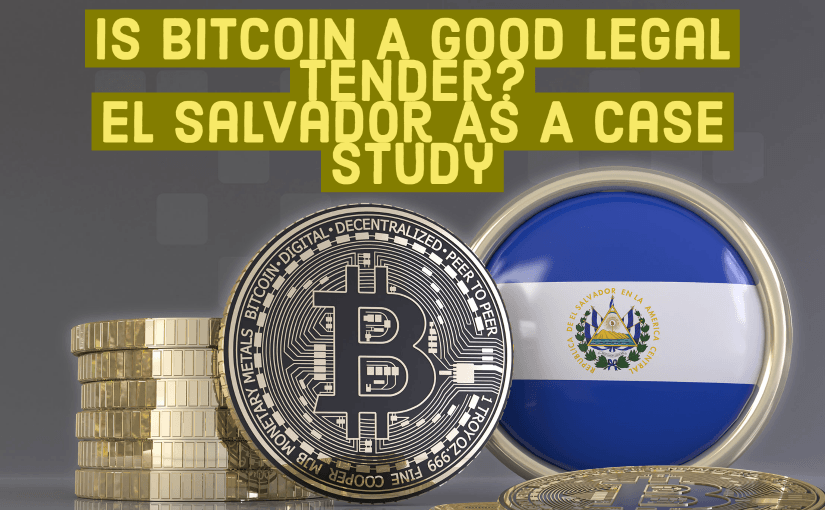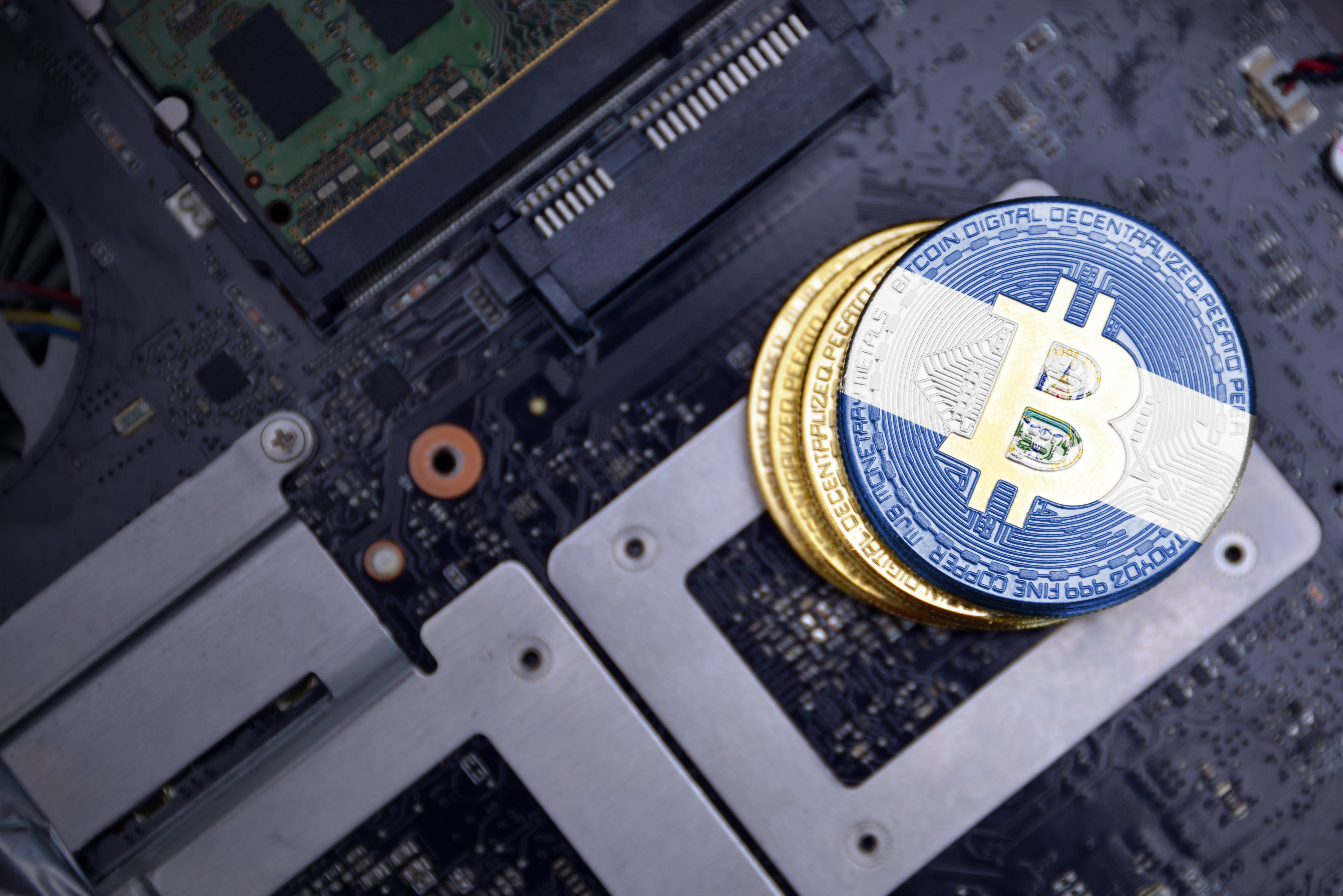Is Bitcoin A Good Legal Tender? El Salvador As A Case Study

Although Bitcoin has already survived a decade marred by legal uncertainties, criminal affiliations and incessant attempts to downplay its potency, events recorded in the last few weeks have no doubt played important roles in the shaping of the digital currency’s future. The first is its sudden emergence as a legal tender in Central America, then there is a recurring narrative surrounding Bitcoin’s power-inefficient mining process.
Lastly, the intensified research and development on central bank digital currencies (CBDCs) highlights some peculiarities between government-powered digital money and decentralized alternatives. In this guide, I will examine all these factors and determine how they shape the future of Bitcoin.
The Curious Case Of Bitcoin As A Lenger Tender
At its inception, Bitcoin served as a decentralized alternative to fiat currencies. The idea that birthed this innovation stemmed from an urgent need to devise means of escaping the frailties of traditional economic policies. The end result was a piece of ingenuity that has inadvertently unlocked a wealth of other innovations. Today, we are not just talking about the potential of Bitcoin but also caught in between an untempered flurry of projects hoping to disrupt various facets of our day-to-day lives.
However, it is surprising that over 10 years after that historic introduction of cryptocurrency, we are still trying to figure out the place of Bitcoin in the global financial spectrum. Should it remain a financial tool for radical minds hell-bent on enabling a new financial order? Or is it potent enough to replace what we have come to believe is the natural way of doing things, particularly in the financial world?
While exploring this seemingly unending debate, it is important to acknowledge that the possibility of ushering in a new era where Bitcoin is widely accepted as a legal tender is not as bleak as it used to be. This is largely due to the recent legislative episodes in El Salvador that saw Bitcoin emerge as a legal tender in the Central American nation. This feat marked the first time that a population would be backed and encouraged by its government to use Bitcoin as a payment method.
A Huge Milestone For Bitcoin?

As expected, this event has sparked a lot of debates. Considering the novelty of this move, there is no saying how such a drastic shift in financial policies could impact El Salvador’s economy. Understandably, bitcoin proponents have applauded this feat and gushed about how establishing Bitcoin as a legal status could unlock new opportunities for the Salvadorians.
One of those crypto proponents who celebrated bitcoin’s new status as a legal tender is Sergey Nazarov, co-founder of Chainlink. He commented:
“The legalization of Bitcoin as a national currency is a uniquely significant event in the history of money, society and globalization,”
Eloisa Cadenas, the co-founder of PXO Token, a stablecoin pegged to the Mexican pesos, also eulogized El Salvador’s acceptance of Bitcoin and explained that it helps showcase the digital currency in a different light:
“It marks a different way of looking at Bitcoin and the crypto industry. For much of its history, Bitcoin has struggled against the notion that its principal use is to launder money or ‘commit fraud,’ with relatively little said about its positive qualities,”
She added that it sets a precedence for Bitcoin as a powerful asset for all socioeconomic levels. Cadenas explained:
“It is wonderful to see that Bitcoin is helping people who really need it, that it is creating financial inclusion, and that it is not only to make money for the treasuries of companies.”
Like Cadenas and Nazarov, Paolo Ardoino, chief technology officer of Bitfinex, feels like this is a great development for both El Salvador and Bitcoin alike. He explained:
“Bitcoin being accepted as a legal tender by El Salvador represents what we have said all along: Bitcoin has utility and is a viable alternative to fiat currencies. As we witness the implementation of digital currencies, I believe we will be seeing big steps for Bitcoin. This is a huge step for the financial freedom of humanity and a monumental moment for Bitcoin.”
Ardoino further suggested that this development might also serve as a turning point for countries in Central and Southern America:
“Bitcoin has resonated for the benefits that it may bring to the tragedy we’ve witnessed in South American economies. The potential it has to bring financial freedom to the region shouldn’t be understated.”
On another note, this development sets El Salvador as an ideal location for Bitcoin proponents and startups. Humayun Sheikh, CEO of Fetch.ai, highlighted this possibility when he told Cointelegraph that the exploit of El Salvador would ultimately promote crypto adoption and attract investors in their numbers:
“A handful of countries adopting Bitcoin or even buying Bitcoin to use as wealth reserves will increase their wealth and lend positive momentum to cryptocurrency adoption.”
Sheikh added that the timing of this development makes perfect sense, considering that China has intensified efforts to ban Bitcoin mining operations and El Salvador is a potential destination for displaced miners:
“The news comes at a time of a clampdown of coal-based mining operations in China and a surplus of mining hardware that needs to be relocated. With its abundance of renewable geothermal energy, El Salvador stands to benefit from these developments and improve the image of Bitcoin mining as a ‘dirty’ process.”
Jeffrey Wang, head of Americas at Amber Group, shared a similar view as he noted that this development unlocks strategic opportunities for El Salvador. He explained that this move removes every ounce of legal uncertainty that could impede the mass adoption of crypto. Wang stated:
“The biggest cloud that hangs over the crypto industry is the uncertainty of regulation, so moving quickly now to embrace it as a country can be a significant advantage to attract capital and talent to your country.”
Furthermore, Wang added that the unfolding events in El Salvador could play out as an interesting test for Bitcoin as a medium of exchange:
“By embracing it early, countries like El Salvador can help boost their domestic economies by welcoming the industry starting with miners where they can use ‘clean’ energy which also addresses the environmental impact of the miners’ use of electricity. It will also be a great early test case to see it [Bitcoin] used as a medium of exchange.”
The Argument Against Bitcoin As A Legal Tender
It is important to point out that this is the first time that Bitcoin would be widely accepted as one of the accepted currencies by an economy. Therefore, it remains to be seen how it would fair, especially since experts believe that it does not have what it takes to anchor the daily lives of a population.
Is Volatility An Issue?

Perhaps, the most recurring excuse against the viability of Bitcoin as a payment system is its volatility. The truth is Bitcoin is susceptible to wild price swings, which is not ideal for an asset considered to be an alternative to fiat.
While payment featured prominently as one of Bitcoin’s potential use cases in its early days, many users now see it as an investment asset. It is easy to assume that a majority of Bitcoin holders are motivated by the investment opportunities induced by the explosive movements of the price of Bitcoin.
So the question is: Why would anyone let go of his/her bitcoin holdings when there is a high potential that the value would increase in the long run? Also, would merchants be open to receiving Bitcoin knowing fully well that the digital currency can lose a significant percentage of its value like it did in May? These are some of the pertinent questions raised by critics of El Salvador’s decision to adopt Bitcoin as a legal tender. Another talking point is the high cost of Bitcoin transactions and its scalability issues.
Eswar Prasad, a professor of economics at Cornell University shared these concerns when he told Cointelegraph that the apparent lack of stability of Bitcoin has its own sets of risks:
“Relying on a cryptocurrency that has unstable value and high transaction costs as a nationally sanctioned medium of exchange seems an act of desperation. A stablecoin backed by a major reserve currency would be a better option for a country whose currency and central bank lack credibility.”
While countering the underlying reasons for El Salvador’s decision, John Hawkins, an economist, raised a similar concern. He noted that the chances that Salvadoran Bitcoin holders will use their digital asset for everyday payment are very slim:
“If the expectation is the price of Bitcoin is going to rise, why would you want to buy things with it? Why not wait? If the expectation is the price is going to fall, why would you want to accept it? For most transactions, using US dollars will still make the most sense.”
To avert the risks, Alistair Milne, a financial economics professor at Loughborough University, says that “firms will protect themselves against the risks of accepting BTC by setting a quite adverse exchange rate. […] So, technically, they accept BTC, but no one would actually pay with BTC.”
Milne argues that merchants and firms would likely impose premium exchange rates for Bitcoin purchases to discourage clients and customers from paying with digital assets. However, note that this is a possibility only if the government does not impose or specify a standard exchange rate.
In response to the concerns raised over the volatility of Bitcoin, Sebastian Ramirez, head of business operations at bitFlyer USA, argued that the price fluctuations would eventually become a non-issue in the long run, especially as Bitcoin becomes more mature:
“A significant majority of the population may still not feel savvy/comfortable enough to use Bitcoin and bear its risks. I don’t expect most locals will benefit from this change in the short-term, but as the space grows and Bitcoin becomes more stable, it will become a tremendous alternative.”
No Economic Impact
Apart from volatility, skeptics say that they do not see how this move will positively impact the economy of the Central American nation. One of such is JPMorgan, which sees no obvious benefit that come with such a decision.
“As with the dollarization in the early-2000s, this move does not seem motivated by stability concerns, but rather is growth-oriented […] But it is difficult to see any tangible economic benefits associated with adopting Bitcoin as a second form of legal tender, and it may imperil negotiations with the IMF.”
Hawkins also touched on the lack of real economic growth stemming from El Salvador’s adoption of Bitcoin when he wrote:
“In very few cases do people buy bitcoins to invest in other things. Bitcoins are their investment. Neither major funds nor average punters holding bitcoins are likely to want to start investing in El Salvador […] Nor is foreign investment a component of GDP (which is the value of market transactions in an economy). Foreigners using bitcoins to buy assets such as land in El Salvador would bid up its price but not necessarily increase GDP. A surge in foreign investment into new infrastructure and businesses that increase productive capacity would contribute to GDP, but there’s no reason to think giving Bitcoin legal tender status will make this more likely.”
Though nothing is etched in stone regarding the economic impact of Bitcoin as a legal tender, one would think that the inflow of foreign investment, particularly from crypto startups, would have positive effects on the nation’s economy. While this is a given, some believe that the move by the Salvadoran government will cause a shortage in the flow of US dollars. According to Steve Hanke, a professor of applied economics at Johns Hopkins University, this economic policy makes El Salvador the obvious choice for foreign Bitcoin hodlers to cash out their holdings, since the US dollar is the other currency accepted nationwide as a legal tender:
“It has the potential to completely collapse the economy because all the dollars in El Salvador could be vacuumed up, and there’d be no money in the country. They don’t have a domestic currency.”
Was Remittance A Contributing Factor?
Like many developing countries, remittance plays a pivotal role in El Salvador’s economy. Salvadorans living outside the country often send money to their friends and relatives living in El Salvador such that remittance accounted for 23% of the nation’s GDP in 2020. Therefore, there is every reason to believe that even if Bitcoin does not outrightly feature as a day-to-day payment method as argued by skeptics, there is a high possibility that it would thrive as a cross-border payment system.
For one, Bitcoin is much faster than traditional cross-border banking solutions. Moreover, it costs way less to send money across borders via the Bitcoin network than through banking systems. As such, using Bitcoin for remittance has its perks. And every Bitcoin believer hopes that these perks are potent enough to lure the average Salvadoran to set up a wallet and receive or send out Bitcoin.
However, this all boils down to the level of crypto education and sensitization delivered in the next couple of months. It is one thing to understand the advantages of using Bitcoin, it is another to know how to use it. Hence, this is where education comes in. It is not enough to just hope that the average Salvadoran would figure things out without having any sort of help; at least this is what Hawkins believes:
“While any cryptocurrency can well facilitate more efficient transfers (without the charges banks impose), the significance of remittances to the Salvadoran economy points to another issue. El Salvador is a poor country, with one of the lowest rates of internet use in the Americas – 33% in 2017, according to World Bank data. How many vendors, street hawkers or farmers are equipped to handle cryptocurrency transactions? US dollars will more than likely remain the default currency.”
Nonetheless, from what we have come to expect from the crypto community, there is always a strong intent to share knowledge and help newbies understand the core workings of crypto payment systems. There is a high probability that developers would go to lengths to build payment infrastructures around established payment systems widely used in El Salvador. With this, transitioning to Bitcoin would be as simple as using a bank app or card.
Will Bitcoin Spur A Black Economy?
Another talking point as regards El Salvador’s adoption of a Bitcoin standard is the likelihood that it might buoy the black economy. Note that this assumption stems from a prevalent misconception that goes way back to the early days of the Bitcoin market. Many Bitcoin skeptics use the digital asset’s history in the darknet as a yardstick for judging its viability. Undeniably, Bitcoin was once a prominent payment method for illegal transactions during the Silk Road era.
What many fail to understand is that Bitcoin operates in a way that makes it difficult to fully cloak one’s activity. The best that Bitcoin offers in terms of privacy is a pseudonymous public address. Given the right tools and a window of opportunity, it is possible to unravel the identities behind a Bitcoin transaction. This coupled with the fact that it is impossible to erase records on the Bitcoin ledger makes Bitcoin less suitable for criminal activities. In light of this, cash remains the payment method of choice for most illicit entities.
Is The Bitcoin Legislation In El Salvador Coercive?
Notably, the inflexibility of the legislation that backs the Bitcoin standard in El Salvador is another point of contention. Article 7 of the legislation reads:
“Every economic agent must accept bitcoin as payment when offered to him by whoever acquires a good or service.”
In other words, merchants and service providers have no say when it comes to the acceptance of Bitcoin. According to this provision, economic agents are not given leeway in this issue. As a service provider, you must set up a Bitcoin payment system whether you like it or not. Although it is still impossible to know for sure if the government plans to enforce this directive, the inclusion of this provision itself implies that there is no freedom of choice.
George Selgin, a monetary economist and historian, explained that although this is a win for Bitcoin, the same cannot be said of financial freedom:
“This is a (relatively) rare instance of something being made compulsory tender not just in settling outstanding debts but in spot exchanges. As such it is even more contrary to the principle of choice in currency. Instead of merely allowing merchants to accept BTC in payment, article 7 compels them to do so even if they’d prefer to be paid in USD (or something else). Very few countries have such Draconian legal tender laws, which in the past were a last-resort of desperate governments.”
Nick Carter, a partner at Castle Island Ventures and co-founder of Coin Metrics, lent his voice to this conversation when he wrote that forcing people to use Bitcoin would ultimately yield an unwanted result. He explained:
“The actual implementation of this provision, which is due to take effect in 80 days, is still uncertain; it seems far-fetched in the extreme to imagine that the Salvadoran government will enforce a bitcoin merchant mandate by force everywhere in the country. Economic exchanges happen millions of times a day, and virtually no state on earth possesses the capacity or the political will to force such a monetary transition on its people. There are countless instances throughout history of states attempting to prohibit or enforce monetary transitions, often at the penalty of death. Generally, economic forces prevail, and when pressed, people tend to find ways to defy state monetary mandates. This instance will be no different.”
Will Other Countries Follow Suit?
There is every chance that this bold move by El Salvador would spur other countries to consider adopting a Bitcoin standard. However, as much as this would establish Bitcoin as a mainstream payment network, it is important to note that there are unique factors that might have made it a lot easier for the Salvadoran government to make this bold move. Perhaps the most telling is the fact that El Salvador is one of the few countries without a local or sovereign currency.
Hence, the government had little to lose in terms of sovereign control over the nation’s monetary distribution and the profits made from issuing a currency. Without any real competition or the risk of losing grip over the economy, it was easy to implement BTC as legal tender. The same can not be said of a majority of other countries. In essence, adopting the BTC standard may not be as straightforward in other countries with established local currencies.
Despite this apparent limitation, some nations seem to be playing around with the idea. Gabriel Silva, a Panamanian legislator, has revealed his intentions to present a bill that could potentially establish BTC as a legal standard. Also, Tanzania’s president, Samia Suluhu Hassan, has encouraged the country’s central bank to come up with crypto-friendly policies that would promote the wide acceptance of decentralized cryptocurrencies.
As argued by Nigel Green, CEO and founder of deVere Group, it is only a matter of time before other developing countries start recognizing Bitcoin:
“Where El Salvador has led, we can expect other developing countries to follow. This is because low-income countries have long suffered because their currencies are weak and extremely vulnerable to market changes and that triggers rampant inflation,”
As for Prasad, countries would be reluctant to accept Bitcoin and other decentralized digital assets because of the risks involved:
“El Salvador’s adoption of Bitcoin is highly unlikely to set off a wave of the cryptocurrency’s adoption as national legal tender by other countries. The flaws and inefficiencies of decentralized cryptocurrencies are too great for them to become viable substitutes for fiat currencies issued by central banks.”
According to Franklin Noll, a monetary historian and the president of Noll Historical Consulting, countries would likely opt for central bank digital currencies (CBDC) to build monetary systems that best suit their economies. This is a more measured option that will eliminate some of the drawbacks of Bitcoin as a payment method:
“Crypto has opened up many options for smaller countries to pursue their own monetary agenda, one that is tailored to their needs […] There is no reason a country cannot establish their own legal tender stablecoin or adopt a pre-existing one. So, I would see El Salvador’s adoption of Bitcoin as part of a trend rather than a milestone.”
CBDCS Emerge As Prominent Options

Before El Salvador broke away from the norms and established BTC as a national legal tender, the whole world seemed to be hellbent on issuing digital currencies within the purview of their respective central banks. China, which is at the forefront of this movement, has somewhat built a national digital currency that could potentially destabilize the global dominance of the US dollar. In response, the United States has begun to play around with the idea of building a digital dollar.
Not to be left out, a similar project is being considered by the EU. Recently, the European Central Bank (ECB) released a report that highlighted the risks of ignoring the CBDC trend. In the report, the bank noted that a digital euro has the potential of promoting financial inclusion and improving cross-border transactions:
“A CBDC would have the potential to widen access to payment services, promote financial inclusion and lower mark-ups of traditional intermediaries. If made interoperable with non-domestic payment systems, it could contribute to filling gaps or correcting inefficiencies in cross-currency payment infrastructures, including for transfers of remittances.”
While many of these nations are yet to decide on the suitable design for their proposed CBDC, the core motivation remains the need for central banks to retain control over the issuance and distribution of money. Rather than let Bitcoin and other decentralized currencies displace fiat currencies, governments are moving to adopt the digital form of money and at the same time preserve traditional monetary architecture.
Why Bitcoin May Outlive The Influx of CBDCs

Most likely, the widely utilized CBDC design would find a way around power inefficient mining processes and low transaction speed at the expense of decentralization. In essence, such currencies would provide almost instant transactions and utilize power-efficient validation systems because of the apparent use of a centralized means of distributing and verifying transactions. On the downside, this design decision would eradicate some of the freedom, especially privacy, afforded by decentralized payment networks.
While speaking on this topic, Jonathan Dharmapalan, CEO and Founder of eCurrency, a company that helps build CBDCs, stated that privacy is a prominent feature that should be considered by central banks. Furthermore, he noted that the design of the CBDC would very much determine the level of privacy provided by a national digital currency:
“It is both customary and an intrinsic feature of cash that transactions between parties remain private. In a CBDC environment, that privacy may not be a given and cannot be taken for granted. It will be essential to consider how privacy is respected and how personal data is protected in a CBDC arrangement. Depending on the design of a CBDC and the extent of the central bank’s role in the arrangement, the central bank could have access to an unprecedented scale of granular transaction information. Possibly transactional data could be available to certain third parties, like banks and service providers, or in the extreme, to everyone.”
Keeping governments’ historical tendencies of ignoring privacy, there is every reason to believe that CBDCs are perhaps the latest and the most sophisticated surveillance systems. With CBDCs, directly tracking and accessing the financial data of individuals has never been easier. Rohan Grey, an assistant professor at Willamette Law, raised these concerns while explaining that it is important to preserve privacy and veer away from a recurring theme of valuing censorship and surveillance over freedom and basic civil liberties:
“It is not uncommon to hear policymakers claim that the adoption of a token-based digital fiat currency instrument that could be used anonymously offline in a peer-to-peer manner, without requiring any common ledger or record, would be radical, or extreme. I profoundly disagree, preserving the right to hold currency and make peer-to-peer payments directly, without third party involvement or approval, is a small c conservative response to the socially disruptive effects of digitization in the internet. If we do not take active and committed steps to reverse our decline into information and surveillance capitalism, including ending the so-called “War on Cash” that is slowly transforming every aspect of our transactional lives into a digitized data stream that can be centrally surveilled and censored, we will end up in a world in which token money and the freedoms and civil liberties that it affords, are functionally extinct.”
Also, it is not far-fetched to assume that governments opting for CBDCs may eventually choose to partially or fully ban decentralized cryptocurrencies like Bitcoin. The core reason for undertaking this drastic shift in economic policy is to contain the growing influence of unregulated cryptocurrencies. Hence, a flurry of hostile crypto regulations following the launch of CBDCs is still very much a possibility.
While this is a given, it is hard to imagine that CBDCs would embody the preference of all crypto users. Some are fully invested in crypto because of its element of decentralization. And so, the emergence of CBDC wouldn’t outrightly eliminate the demand for Bitcoin. This is why the director of the Digital Currency Initiative in MIT, Dr. Neha Narula, believes that the CBDC and decentralized digital currencies will coexist:
“Cryptocurrency and central bank digital currency are not mutually exclusive and will coexist. One prominent reason people use cryptocurrency is because its issuance is determined by software in a decentralized network, instead of a central bank, a central bank digital currency would not replace this preference.”
And even though most policymakers would favor CBDCs, Bitcoin’s appeal stems from the demand for monetary systems that do not require the input of governments or banks. As long as Bitcoin remains a decentralized network, there will always be a place for it in whatever version of the future that the current digitalization trends bring.
Final Thoughts
The acceptance of Bitcoin as legal tender will not put an end to the debate about Bitcoin’s viability as a mainstream payment solution. While this is a given, the development is the first test case for Bitcoin as legal tender. Therefore, it is important to closely monitor the short-term and long-term impacts of El Salvador’s monetary policy changes as the success or failure of this decision could determine the fate of decentralized cryptocurrencies, especially those designed as payment solutions.
More importantly, Bitcoin has emerged as legal tender at a time when CBDC looks like the obvious choice for central banks. So, whether it is intentional or not, comparisons will be drawn between the performances of CBDCs and that of Bitcoin in El Salvador and other countries that eventually adopt it in the future. However, whatever the case may be, Bitcoin will remain the obvious choice for those looking to enjoy the perks of decentralization.


